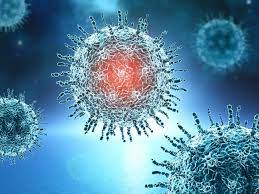Genital herpes is one of the most common sexually transmitted diseases. In fact, statistics estimate that more than 500 million people worldwide are infected with genital herpes.
What is genital herpes and how is it transmitted?
Genital herpes is a sexually transmitted infection caused by the herpes simplex virus (HSV), which has two subtypes: HSV-1 and HSV-2. It is a permanent infection: in fact, once infected, the virus remains latent in the body for life. It recurs when the immune defense is weakened (moments of psychophysical stress, fever, immunosuppression).
Like other sexually transmitted diseases, genital herpes is highly contagious. In fact, the virus can be transmitted during sexual intercourse (vaginal, anal and oral) and through contact with infected body fluids such as semen, vaginal secretions and/or saliva.
In most cases, this infection has no symptoms, making it difficult for those suffering from it to know that they have contracted the disease. As a result, people with genital herpes can easily and quickly spread the infection without even knowing that they are carriers of the disease.
How does genital herpes manifest itself?
As we have already mentioned, in most cases (about 80%) genital herpes is asymptomatic. Otherwise, there are some symptoms that can help you recognize the presence of genital herpes. Typically, this infection manifests itself as single or grouped whitish blisters in the genital and anal area. These blisters create an inflamed area that often causes itching and burning in the genital area, which is accompanied by a feeling of pain when urinating. In extreme cases, the inguinal lymph nodes swell. Finally, this infection can cause fever and general malaise.
The above symptoms appear approximately 4-7 days after contact with the infection (incubation period). Then, after about 2 to 3 weeks, the fluid-filled blisters burst , resulting in genital ulcers. They are concentrated in the genital area, but can also occur on the thighs, buttocks and perianal area.
Is this dangerous?
Thanks to our immune defenses and taking certain medications, the symptoms may disappear. But even in the absence of these manifestations, the HSV virus is not completely defeated, but remains latent inside the body in an inactive state and can reappear in the event of a weakening of the immune system (with more or less frequent relapses).
When you first become infected with genital herpes (primary infection), the symptoms are more obvious, painful and last longer than with relapses, and if left untreated, this infection can lead to serious consequences for the male genital organs, such as urethritis and prostatitis. Early treatment is a great way to avoid complications.
How is genital herpes treated?
The best advice for treating herpes is its timely diagnosis at the Bogolyuby Medical Center . In fact, early diagnosis allows treating the virus in the active phase, in which the drugs act effectively. Specific drugs for the treatment of this pathology are antiviral agents ( acyclovir , valacyclovir or famciclovir ), which reduce the duration and severity of symptoms, as well as prevent the replication of the virus and reduce the likelihood of relapses. In addition to drug therapy, in case of HSV infection, certain hygiene rules should be followed. Here's what they are: Gently wash the infected genital area with water and a mild intimate cleanser; keep the area dry to prevent secondary infections; wear cotton, loose-fitting underwear.

















